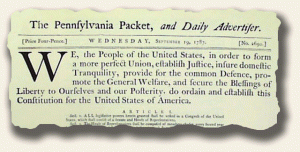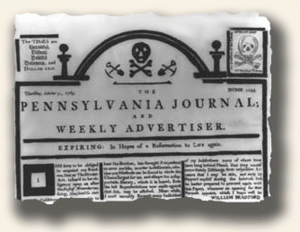The Traveler… Stamped out…
March 7, 2016 by The Traveler · Leave a Comment
 Today, by the means of The Edinburgh Advertiser dated March 7, 1766, I traveled to Scotland where I found that they received a letter from Bristol dated March 1st containing a report of a premature celebration in England of the repeal of the Stamp Act. Although the repeal was official on March 16, early readings in Parliament of the repeal bill gave notice that it would happen soon. “Never was joy more general or citizens hearts more sensibly touched than ours on Monday last on hearing the favourable turn of the American affairs. The bells throughout the city rang incessantly…”
Today, by the means of The Edinburgh Advertiser dated March 7, 1766, I traveled to Scotland where I found that they received a letter from Bristol dated March 1st containing a report of a premature celebration in England of the repeal of the Stamp Act. Although the repeal was official on March 16, early readings in Parliament of the repeal bill gave notice that it would happen soon. “Never was joy more general or citizens hearts more sensibly touched than ours on Monday last on hearing the favourable turn of the American affairs. The bells throughout the city rang incessantly…”
~The Traveler
The Traveler… give it up for the second time, with a little help…
December 21, 2015 by The Traveler · Leave a Comment
 Today I traveled to Edinburgh by the way of The Edinburgh Advertiser dated December 20, 1765. There I found an account of a New Hamsphire stamp agent by the name of George Meserve being forced to resign for the second time. “…that Mr. Messerve, notwithstanding his late verbal resignation, determined to execute his office…about 400 resolute men, well equipped…Their purpose was to demand of Mr. Messerve a more explicit resignation…the repeated assurances from the Council, that the bale of stamped paper should not be opened…that they would never use them on any account, disarmed the populace of all their resentment…The stamped papers sent for the use of this province are lodged in the fort at Newcastle where they are to remain as a dead inactive lump of matter…”
Today I traveled to Edinburgh by the way of The Edinburgh Advertiser dated December 20, 1765. There I found an account of a New Hamsphire stamp agent by the name of George Meserve being forced to resign for the second time. “…that Mr. Messerve, notwithstanding his late verbal resignation, determined to execute his office…about 400 resolute men, well equipped…Their purpose was to demand of Mr. Messerve a more explicit resignation…the repeated assurances from the Council, that the bale of stamped paper should not be opened…that they would never use them on any account, disarmed the populace of all their resentment…The stamped papers sent for the use of this province are lodged in the fort at Newcastle where they are to remain as a dead inactive lump of matter…”
~The Traveler
#17 – Most historic: Pre-Revolutionary War… (*revisited)
May 9, 2014 by GuyHeilenman · Leave a Comment
As our last discussion point on the most historic event to have in an early American newspaper collection we’ll consider the pre-Revolutionary War era.
What a period of time, from the mid-1600’s thru 1775. Keep in mind that the only newspapers to be had with American content thru 1704 would be British, most likely limited to the Oxford/London Gazette. The “Boston News-Letter” as America’s first successful newspaper began in 1704 but it can be exceedingly difficult to find any American newspaper prior to 1730. In any case let’s consider the event & not the rarity of the newspaper itself. Remember, we’re dreaming here anyway.
Dig out your history books and give thought to what single historic event in American history from this period you would like to have in your newspaper collection.
Much of the late 17th century was dealing with settling the “New World” and territorial issues not just with the Native Americans but the various European countries, all trying to establish a foothold, and increasing it at that. The early 18th century saw the creation of colonial governments and continuing territorial problems, leading to the French & Indian War, which in itself created financial problems in England which led to greater taxation in America to pay for related expenses. Of course the colonists were not keen on tightening controls and increased taxation levied by a government 3000 miles away and before long there was a revolution.
My choice would be the “Pennsylvania Journal & Weekly Advertiser” issue of Oct. 31, 1765. Known as the “tombstone edition” because of the great graphics, it signaled the beginning of the Stamp Act in America, the most hated of the taxes up to that point, only to be following by more from Great Britain. The Stamp Act was the catalyst for a disintegrating relationship with the mother country. This newspaper (see photo) is both visually dramatic and historically significant in presaging the biggest event in 18th century America history.
What’s your thought?
—————
*The Fall of 2013 marked the 5th anniversary of the History’s Newsstand Blog by Timothy Hughes Rare & Early Newspapers. We are grateful to have the opportunity to contribute to the newspaper collecting community, and appreciate those who have participated through guest posts, comments, and readership. This year (2014) we are revisiting the top 25 posts (measured by activity), with the number 1 post being re-posted during the first week of 2015. Please enjoy. If you would like to contribute a post for consideration of inclusion on the blog, please contact Guy Heilenman at guy@rarenewspapers.com.
The “top ten”: 18th century…
December 14, 2009 by TimHughes · 9 Comments
Continuing with our “top ten events to be found in newspapers” for various periods of time, today we consider the 18th century.
What an event-filled one hundred years it was. As you can tell by the list my focal point is on the American Revolution, but there are other events or specific newspapers which made it into my top ten.
Again I offer apologies to our non-American friends as this list has a decidedly American bias, primarily because the vast majority of those who purchase from us are American.
Here we go, starting with number ten:
 10) Death of George Washington, 1799 (Front page, preferably in a Virginia Gazette)
10) Death of George Washington, 1799 (Front page, preferably in a Virginia Gazette)
9) Hanging of Captain Kidd, 1701 (Just can’t resist a great pirate hanging, he being perhaps the most famous of all time)
8.) Any newspaper with the first installment of Paine’s “The Crisis” (“These are the times that try men’s souls…” has to be one of the more famous beginnings of all time)
7) Full text of the Stamp Act (Certainly a trigger event that would lead to the Revolution)
6) Boston Tea Party (In a Boston newspaper. An event every school kid knows about)
5) The Pennsylvania Journal, Nov. 1, 1765 “skull & crossbones” engraving (Replaced its normal masthead on this date: seen in most history books)
 4) Battle of Lexington & Concord with mention of Paul Revere’s ride (The beginning of the Revolutionary War. I had one once with mention of Revere–exceedingly rare–great to have in a Boston area newspaper)
4) Battle of Lexington & Concord with mention of Paul Revere’s ride (The beginning of the Revolutionary War. I had one once with mention of Revere–exceedingly rare–great to have in a Boston area newspaper)
3) The Boston News-Letter, 1704 (Great to have issue #1 of America’s first successful newspaper, but any issue from 1704 would do)
2) The Pennsylvania Packet, Sept. 19, 1787 (First newspaper to print the Constitution, & done in broadside format. Need I say more?)
1) The Declaration of Independence, 1776 (Ideally the Pennsylvania Evening Post, July 6, 1776, but the Packet of July 8 would work too as it contains the Declaration entirely on the front page: better for display).
Most historic: Pre-Revolutionary War…
March 16, 2009 by TimHughes · 3 Comments
As our last discussion point on the most historic event to have in an early American newspaper collection we’ll consider the pre-Revolutionary War era.
What a period of time, from the mid-1600’s thru 1775. Keep in mind that the only newspapers to be had with American content thru 1704 would be British, most likely limited to the Oxford/London Gazette. The “Boston News-Letter” as America’s first successful newspaper began in 1704 but it can be exceedingly difficult to find any American newspaper prior to 1730. In any case let’s consider the event & not the rarity of the newspaper itself. Remember, we’re dreaming here anyway.
Dig out your history books and give thought to what single historic event in American history from this period you would like to have in your newspaper collection.
Much of the late 17th century was dealing with settling the “New World” and territorial issues not just with the Native Americans but the various European countries, all trying to establish a foothold, and increasing it at that. The early 18th century saw the creation of colonial governments and continuing territorial problems, leading to the French & Indian War, which in itself created financial problems in England which led to greater taxation in America to pay for related expenses. Of course the colonists were not keen on tightening controls and increased taxation levied by a government 3000 miles away and before long there was a revolution.
My choice would be the “Pennsylvania Journal & Weekly Advertiser” issue of Oct. 31, 1765. Known as the “tombstone edition” because of the great graphics, it signaled the beginning of the Stamp Act in America, the most hated of the taxes up to that point, only to be following by more from Great Britain. The Stamp Act was the catalyst for a disintegrating relationship with the mother country. This newspaper (see photo) is both visually dramatic and historically significant in presaging the biggest event in 18th century America history.
What’s your thought?





